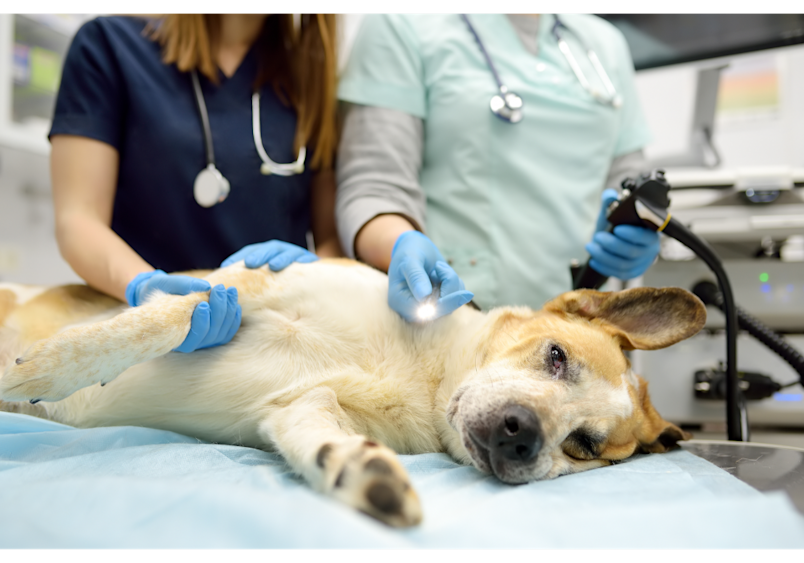
There are so many good reasons to neuter your dog, and I, along with most veterinarians, will agree that it’s the most responsible and healthiest option for your pup. However, we understand that cost considerations can get in the way, especially when you’re not sure how much to expect to pay. For most private practices, look to pay between $300-$500 for the surgery, but less expensive options may be available.
Please keep in mind that this estimate isn’t just a number—there’s a whole lot that goes into determining how much it costs to neuter a dog. Understanding those factors, as well as knowing what neutering is, why it’s a definite plus, and how you may be able to save money, helps you make an informed choice.
What is Dog Neutering?
Whether this is your first dog or one of many, you’ve likely heard about spaying and neutering, but what exactly do those words mean? A term that covers both procedures is sterilization—not the removing bacteria and microbes definition but rather removing an animal’s ability to reproduce. For male dogs that means removing the testicles, for females that means taking the uterus and/or the ovaries.
The term spaying is only used for the sterilization procedure in females. Technically neutering can be used to describe sterilizing both male and female dogs, but we tend to use it more to describe the castration process that males go through. For the purpose of this article, we will be focusing specifically on the costs associated with neutering a male dog.
Health Benefits of Neutering
Every part of the body has its job and benefits; it also has the ability to cause problems. The reproductive parts are no different, so as you can imagine, removing them removes the possibility that they will get diseased. Along with removing the actual parts, neutering removes the majority of reproductive hormones that can be responsible for negative actions as well.
Neutering your dog completely obliterates the chances of them getting testicular cancer. It also greatly reduces prostate issues such as cancer, infection, or hyperplasia. Removing hormones like testosterone will reduce a dog’s breeding instincts which can cut down on roaming, aggression, and urine marking. Please keep in mind that these behaviors aren’t solely governed by testosterone. There are many factors at play here, so neutering won’t always be a complete fix.
Age Consideration and Timing of Neutering a Dog
We used to think the sooner the better when it came to neutering, might as well get rid of the testicles before a dog has a chance to father an unplanned litter. Recent research has made us think twice about this catch-all belief. When to neuter a dog should be an individualized decision that you and vet come to together.

Puppy Neutering (3-6 months)
Six months used to be the go-to age for getting a puppy neutered. It allowed their bodies a bit of time to grow and mature so that they could handle aesthesia more easily and gave the testicles a bit more time to drop down. It’s also more likely to catch a female dog before she comes into her first heat so that you never have to deal with that.
Even though it was the norm, it doesn’t mean that it continues to be. It’s been shown that neutering before a dog fully matures can increase the risk of joint disorders and even some types of cancers in larger dog breeds. Yikes! We don’t want to fix one issue only to cause another, so many vets have taken to waiting until a pup is older.
Adult Dog Neutering (1-5 years)
For larger breeds, your vet will likely recommend waiting until your dog has reached his mature size to neuter. For most dogs this falls into the 12-18 months of age category which means he will likely start to display some sexual behaviors and you’ll need to keep a vigilant eye on him to keep him from looking for ladies.
Senior Dog Neutering (7+ years)
It’s never too late to neuter a dog, provided your vet determines the procedure's benefits outweigh any age-related risks. Senior pups can still reap the benefits of neutering, but after a while it starts to become a balance of ensuring the surgery is worth the increased risks that some age-related health conditions can pose for going under anesthesia.
Pre-Puberty vs. Post-Puberty Considerations
The benefits of neutering a pup before puberty means he’ll never get a chance to learn what testicles are for, potentially decreasing issues such as aggression and roaming related to hormones. The downside is, he hasn’t reached his mature size by the time puberty comes around, so neutering then can increase the risk of joint issues and cancers in some larger dog breeds.
Best Age to Neuter by Size
Your veterinarian knows best, so be sure to discuss the most appropriate neutering time for your pup.
Small breed dogs are fairly lucky in that they can be neutered earlier, usually around six months of age. They don’t seem to carry the risks that larger breeds do.
Medium to large breeds should be neutered after they finish growing, usually around nine-12 months of age.
Large and giant breeds need to wait until they’re fully mature which happens between 12 and 18 or even 24 months.
Cost Breakdown by Dog Size
Once you have the when part figured out, you’ll want to know how much this surgery is going to cost you, so you can plan accordingly. I hate to tell you, but the cost will range depending on your dog’s size, your location, and where you get the surgery done.
Generally speaking, larger dogs are going to cost more because they require more medications to get them under, more anesthesia to keep them under, and more materials to get the job done. Based on that, here’s what you may end up paying to get your dog neutered based on size:
Small dogs (under 25 lbs): $50-$300
Medium dogs (25-50 lbs): $150-$500
Large dogs (50-90 lbs): $200-$700
Giant dogs (over 90 lbs): $200-$750
Besides size, where you live will have an effect on pricing, with urban areas tending to charge more than rural areas due to cost of living.
Where to Get Your Dog Neutered (Price Comparison)
Here’s the where in the neutering story. The type of clinic that does the procedure will have an effect on the price that you pay.
Private practices: $200-$700
Low-cost neuter clinics: $50-$200
Animal shelters and rescues: $50-$200
Veterinary school: $150-$300
Mobile veterinary clinic: $200-$700
Low-cost clinics and shelters may be able to offer a lower price because supplies and expertise may be donated. They may also only perform the procedure on specific days so that they are able to offer a discount due to the volume of surgeries they perform.
Hidden Costs and Additional Fees
No matter where you choose to get your dog neutered, they will try to be upfront with you on the costs, but sometimes there may be some additional fees that either come up unexpectedly or that aren’t factored in initially.
Pre-Surgical Requirements
It’s important to ensure that a dog is healthy enough to undergo a neutering procedure, which may mean pre-anesthetic blood work and an exam that come at an additional cost.
During Surgery Add-Ons
How much it costs to neuter a dog is based on the typical surgery, but not every dog is typical. Some dogs may rack up additional costs due to complications, such as cryptorchidism, being overweight, and other medical conditions. These conditions may require additional medications or surgery time to get the job safely done.
Post-Operative Costs
Also depending on the clinic and how your dog responds to surgery, there may be additional costs for recovery. Hospitalization, post-op medications, or rechecks may be added on.

Cost-Saving Strategies
Veterinarians don’t want how much it costs to neuter a dog to be a deterrent for having the surgery done, so if finances are an issue, there are some lower cost options. You can start by contacting your local shelter or rescue to see if they offer any sort of spay and neuter clinic where prices will be reduced. Since you should already be having the neuter conversation with your vet over and over, you can also ask them if they offer any promotions like discounts for Spay and Neuter Month in February.
Pet Insurance for Neutering a Dog
You can also look into dog insurance to help with costs. While it doesn't cover the neuter itself, it can relieve some of the stress surrounding the surgery knowing that you're covered for any other accidents and illnesses. It could reimburse you for complications during the surgery, like a bad reaction to the anesthesia or an infection afterward. It also covers the huge bills for accidents your dog might have while they're still intact, like getting into a serious dog fight or getting hit by a car while trying to run off. Plus, it covers all the major illnesses and accidents your pup will face throughout their life.
So, to actually budget for the neuter, you'll want to add an optional dog wellness plan. This separate plan is designed specifically for predictable care, including vaccines, check-ups, and the neutering procedure. It helps you by turning that big, one-time surgery cost into small, manageable monthly payments, making it much easier to afford the cost to neuter a dog.
Along with potentially helping with neutering costs, purchasing a pet insurance policy can make sure you have your financial bases covered, helping to ensure that your dog lives the long and healthy life they were meant to.
So How Much Does It Cost to Neuter a Dog?
Getting your dog neutered is not only an important milestone in their growth and development, it’s also very important for preventing unwanted pregnancies, and reducing or eliminating the risk of certain health conditions. Neutering is an important surgery for your dog, but it can also be an expensive one, potentially costing $200-$700 or more. Look at low-cost options such as spay and neuter clinics offered by shelters or rescues or speak to your vet about specials they may run at their particular clinic.
By taking the time to understand the factors that influence the cost—from your pup's size to the kind of clinic you choose—hopefully you’ve moved past the initial overwhelm and are feeling confident about what to expect. Now you’re ready to check this item off your list and enjoy the healthy, worry-free years ahead with your best friend.